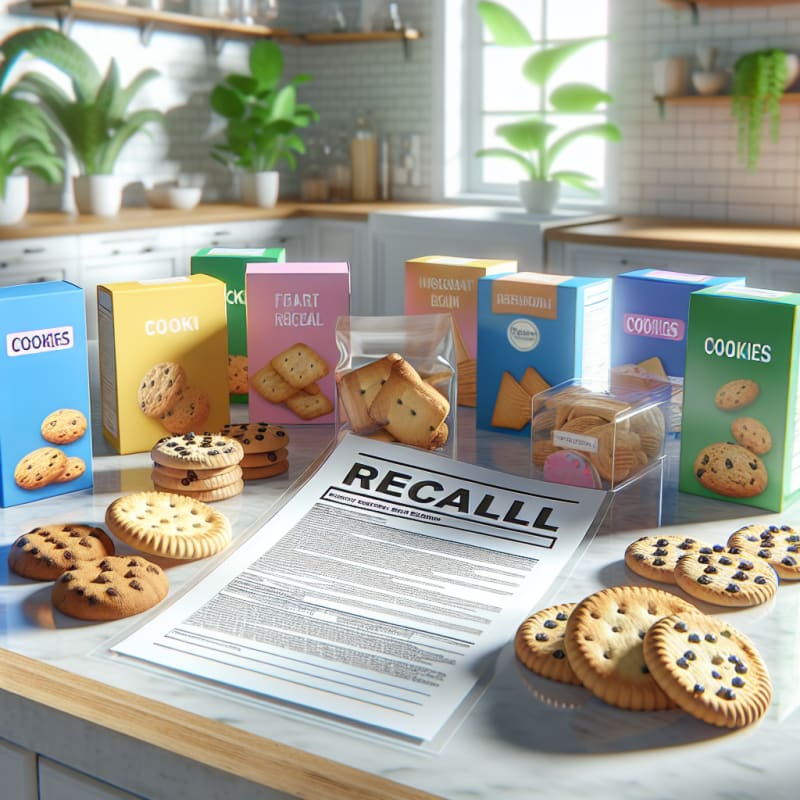FDA Issues Urgent Recall for Cookies with Cancer-Linked Ingredients: What You Need to Know FDA Issues Urgent Recall for Cookies with Cancer-Linked Ingredients: What You Need to Know Staying informed about food safety is more important than ever, especially when it comes to hidden ingredients that may impact your health. Recently, the U.S. Food and Drug Administration (FDA) issued an urgent recall for several popular cookie brands after discovering multiple ingredients linked to increased cancer risk. This article breaks down what you need to know, how these recalls compare globally, and how tools like Food Scan Genius can help you make smarter, safer food choices. Why Did the FDA Recall These Cookies? According to a recent MSN news report, the FDA initiated the recall after routine testing found that several batches of cookies contained elevated levels of certain chemical additives and artificial coloring agents. These ingredients, including potassium bromate, titanium dioxide, and certain synthetic dyes, have been classified or flagged by international health authorities as potential carcinogens1. Ingredient Potential Health Risk Regulatory Status (US vs EU) Potassium Bromate Classified as a possible human carcinogen Banned in EU; permitted in US with limits Titanium Dioxide Linked to DNA damage and cancer in animal studies Banned in EU (2022); allowed in US Red Dye 3 Associated with thyroid tumors in animal studies Banned in EU; allowed in US in foods For a full list of recalled products and batch numbers, visit the FDA’s recall database. What Does the Science Say About These Ingredients? Potassium Bromate: Classified as a Group 2B carcinogen by the International Agency for Research on Cancer (IARC). Studies have shown it can cause tumors in the kidneys and thyroid of laboratory animals2. Titanium Dioxide: The European Food Safety Authority (EFSA) concluded in 2021 that it can no longer be considered safe as a food additive, citing concerns over genotoxicity3. Red Dye 3: The U.S. National Toxicology Program found evidence of carcinogenicity in animal studies, leading to its ban in cosmetics but not in food4. How Do Labeling Laws Differ Between the U.S. and Europe? Ingredient disclosure and food safety regulations vary significantly between countries. Here’s a quick comparison: United States (FDA): Allows certain additives with established limits; labeling must include major allergens but not always detailed information on all additives. European Union (EFSA): Stricter on food additives—many substances banned in the EU are still permitted in the U.S. The EU also requires more detailed ingredient labeling and clearer allergen disclosure. For example, titanium dioxide was banned as a food additive in the EU in 2022, but it remains legal in the U.S. This means products sold in the U.S. may contain ingredients you won’t find in their European counterparts. Recent Developments in Food Safety and Ingredient Regulations Food Safety News: Food recalls rise amid increased testing New York Times: Food dyes banned in Europe still allowed in U.S. CNN: New food labeling laws target cancer-linked ingredients These developments highlight the growing global concern over food additives and the need for consumers to stay vigilant—especially those with food sensitivities or dietary restrictions. How Food Scan Genius Helps You Stay Safe Food Scan Genius is designed to empower consumers with instant ingredient insights. Whether you have allergies, follow a specific diet, or want to avoid certain additives, simply scan the barcode of any packaged food to: See a detailed breakdown of ingredients and additives Get alerts about cancer-linked or banned substances Compare product formulations across different countries Access up-to-date recall and safety alerts User Testimonial: “After my daughter’s allergy diagnosis, Food Scan Genius became our go-to app. It flagged a snack with titanium dioxide that I would have missed. I highly recommend it to anyone who wants peace of mind at the grocery store!” — Download Food Scan Genius FAQ: Understanding Food Recalls and Ingredient Risks Q: Which cookies are affected by the recent FDA recall? A: Check the official FDA recall list for specific brands and batch numbers. Q: Are these ingredients banned in other countries? A: Yes. Potassium bromate, titanium dioxide, and Red Dye 3 are banned or heavily restricted in the EU and other regions. Q: How can I avoid recalled or risky products? A: Use tools like Food Scan Genius to scan products, read ingredient lists, and stay updated on recalls. Q: What should I do if I have purchased a recalled product? A: Do not consume it. Return it to the store or follow the recall instructions from the FDA. Conclusion: Make Smart Food Choices with Ingredient Awareness Understanding what’s in your food is essential for your health and peace of mind. With recalls on the rise and ingredient regulations evolving, staying informed is your best defense. Whether you have allergies, dietary preferences, or just want to avoid risky additives, using tools like Food Scan Genius can help you shop smarter and safer—wherever you are in the world. Sources: 1 American Cancer Society: Food Additives 2 PubMed: Potassium Bromate Carcinogenicity 3 EFSA: Titanium Dioxide Safety Assessment 4 National Toxicology Program: Food Dyes





